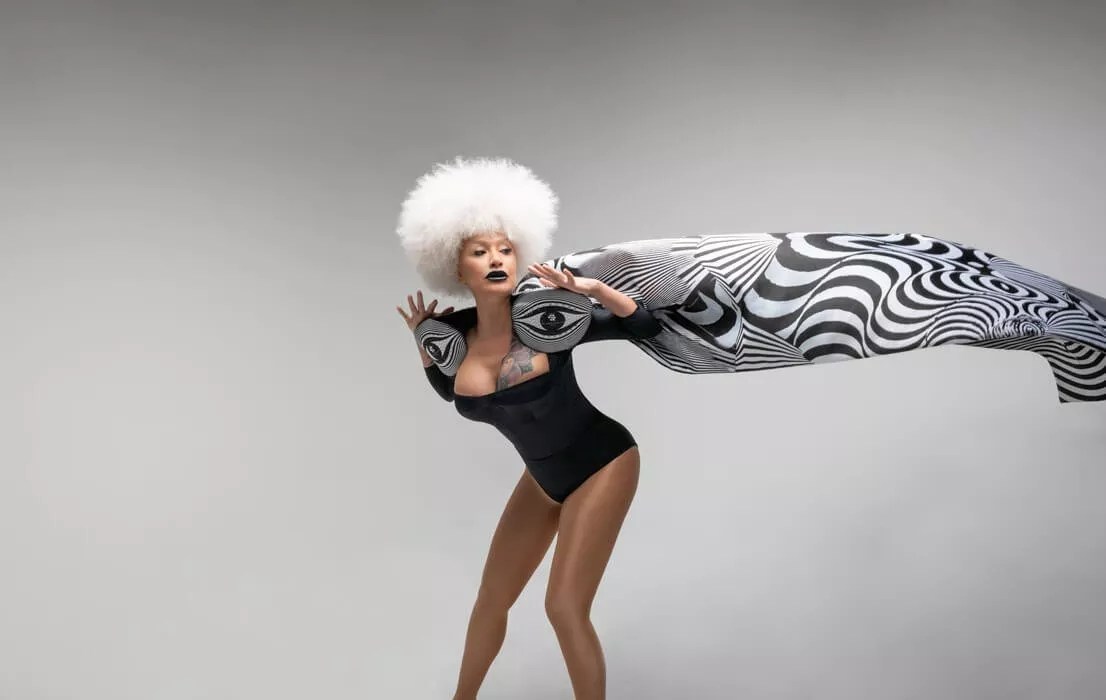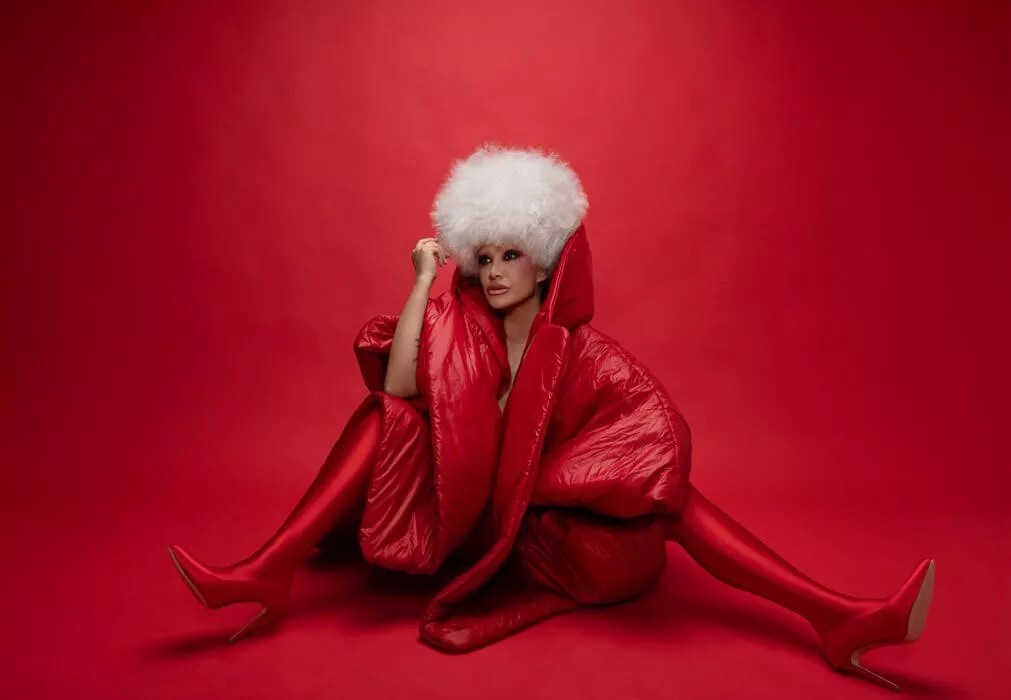
Ashley White PR

Audio By Carbonatix
This story was first published by LOOKOUT, an investigative nonprofit news organization covering Arizona’s LGBTQ+ communities.
Lady Blackbird, the dynamic force behind “Black Acid Soul,” is a captivating artist whose journey has taken her from the small city of Farmington, N.M., to the global stage. Born Marley Munroe to evangelical Christian parents, Lady Blackbird’s early exposure to music came through the church, where she honed her voice and found her first performance opportunities. Over time, she found herself questioning the constraints of her upbringing, particularly her identity as a queer woman of color, a theme that is central to her work today.
After years of trying to find her place in the industry, including stints as a session singer and songwriter, Lady Blackbird’s breakthrough came with her 2021 album “Black Acid Soul.” Unlike her previous work, which largely consisted of covers, 2024’s “Slang Spirituals” represents a raw, unfiltered exploration of her life and experiences.
Often compared to the likes of Grace Jones and Nina Simone, Lady Blackbird’s performances are known for their extravagant costumes and electric energy, as she continues to push boundaries both musically and politically. A longtime advocate for women’s and LGBTQ+ rights, she’s using her platform to amplify her personal truth and encourage others to do the same.
LOOKOUT recently spoke with Lady Blackbird, where she discussed transitioning from a covers-only artist, writing her own lyrics, her coming out “process” and much more. This interview has been edited and condensed for clarity.
LOOKOUT: Tell me about growing up in Farmington, N.M. What’s it like there? What’s there in terms of the arts?
Lady Blackbird: Absolutely nothing. It was challenging – there were few outlets for expression. I grew up singing, but it was more of a church thing. My mom was like my first manager, booking me for fairs, weddings and churches around the Southwest.
Was your upbringing a big influence on your current performance style? They call you the “Grace Jones of jazz,” so you had to have at least grown up with a lot of her in your life? Did you connect with artists like Iggy Pop or David Bowie, those kinds of performance artists? Or did that come later?
I grew up listening to Gladys Knight, Chaka Khan, Billie Holiday and Stevie Wonder. They shaped my voice because I never had formal lessons. They were my lessons – hours on end in the bedroom with headphones, listening to Stevie Wonder and Donny Hathaway, dreaming of being on that stage like they were. It wasn’t the easiest dream to keep alive where I was from, but I’ve always loved to do it. As far back as I can remember, I don’t have an earlier memory of anything other than singing.
You’ve been described as a “late-blooming star.” Do you agree with that?
I would say so. It’s been a long journey. I was signed young, to a Christian label, but nothing came of it. Later, I signed with Epic and recorded an album, but it didn’t take off. It was always “almost.” Eventually, I ended up back with my producer, Chris Seefried, and we were trying to figure out what would work. We wrote all different genres and styles.
He had me demo a song after one of our writing sessions – the demo for “Nobody’s Sweetheart” that’s on “Black Acid Soul.” When he played it for people, their response changed. They listened better, clearer, deeper. That’s when he had the idea to strip things down and focus more on my voice than on big musical production. And I said, “Well, can I still wear my costumes and all my crazy madness?” And he was like, “Yes, you can still wear your costumes, but let’s make this more about your voice.” And that’s how “Black Acid Soul” came about. So definitely late, but all in perfect timing.
How does it feel to have your voice center-stage now, especially with “Slang Spirituals” being so personal?
The best word is “vulnerable.” Not that my past work wasn’t authentic, but this was definitely more vulnerable than anything I had done before. “Black Acid Soul” had a lot of covers, aside from “Fix It” and “Ruler of My Heart.” And now, “Slang Spirituals” is all originals, except for the Bettye Swann cover. These original songs are personal – they tell stories of my life, of how I felt growing up. So there’s a new vulnerability in this album. You never know how people are going to react to something so personal. But it’s been beautifully received, and I’m very thankful for that.

Lady Blackbird’s ‘Slang Spirituals’ is an interesting direction for the jazz singer.
Ashley White PR
You mentioned growing up in a Christian household. How did that align with your coming-out story? Were they ever in conflict with your being queer?
Absolutely. That’s a big part of what “Slang Spirituals” is about. As a child, you don’t have a voice. You become who your parents shape you to be, based on their fears and beliefs. I wouldn’t say I had a coming-out story – I never felt like I needed one. I just never realized it was okay to be who I was. Once I started asking why being gay was sinful, I realized a lot of people didn’t have an answer beyond “because the Lord said so.” And that wasn’t enough for me. I had to stand behind my truth, even when it wasn’t welcomed openly. At the end of the day, whoever liked it – great. Whoever didn’t -also great. I respect others, and I expect that respect back.
Did it take time to find your support system?
I absolutely had to seek them out. Depending on how you were raised, the people around you might only give safe answers. I had to find my people – those who didn’t answer based on fear or religion but with honesty, love and acceptance. It took a while, and sometimes I felt lonely. But eventually, I found my circle.
I feel that. I want to go back to your upcoming U.S. tour. What do you want people to take away from your performances?
A bit of everything. I want to entertain. I want to push buttons. I want people to feel something. The first time I performed “I Am What I Am,” I could see people singing along, feeling those lyrics, connecting with their own stories. That energy, that connection – it’s the most important part of what I do.
Has anyone ever told you your music helped them through a tough time?
So many times. People at meet-and-greets, messages on Instagram – people saying my music got them through their toughest times. Music is powerful. And to know mine has done that for someone is mind-blowing.
You’re touring the U.S. after mostly performing in Europe. How do you feel about this new chapter?
It’s new. The U.K. and Europe have been my base, but now we’re starting to tour the States. A lot of these places, I haven’t even been to yet. But I’m looking forward to it. This is just the beginning.
Lady Blackbird performs at Musical Instrument Museum (4725 E. Mayo Blvd.) at 7 p.m. on Sunday, March 2. Tickets run $38.50 to $49.50; grab yours now via MIM.org.